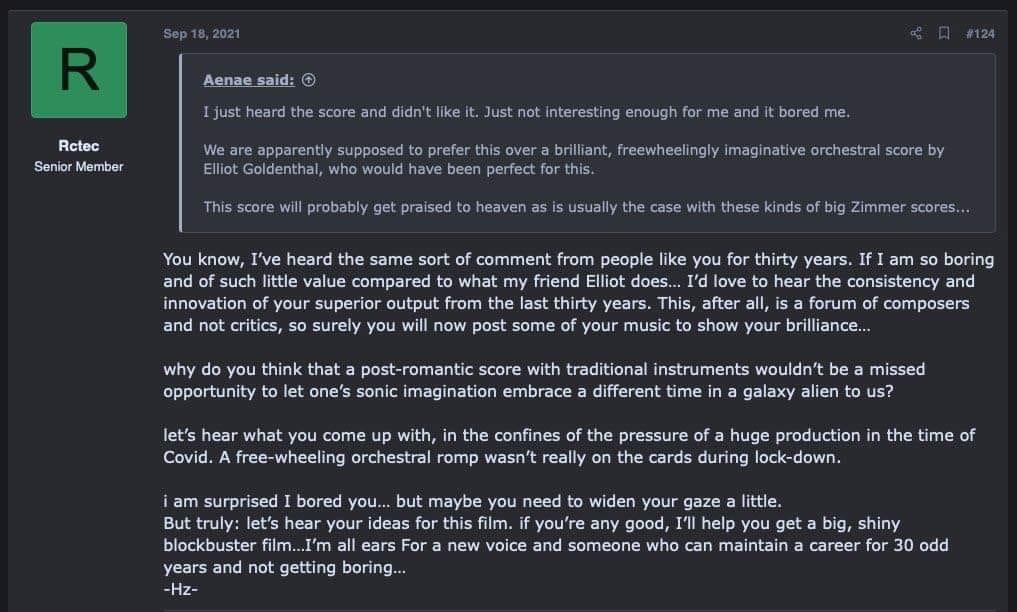
Iniciado por
Branagh/Doyle

Pues Muerte en el Nilo de Doyle se ha llevado 4 estrellas en filmtracks (Clemmensen) y la máxima consideración en moviemusicuk (Broxton).
La verdad es que escuchar música así en 2021 es un lujo:
Doyle’s score for Death on the Nile is a classy, sophisticated orchestral score that combines moments of expansive lyricism for the majestic Egyptian landscape, tender romantic writing for the inter-personal relationships at the heart of the story, and quite a lot of low-key brooding suspense music punctuated by occasional moments of intense action.
Doyle’s score is markedly different from the music that Nino Rota wrote for the 1978 Death on the Nile, eschewing a lot of the classical flamboyance of that score in favor of a more intimate sound. Interestingly, especially considering that Death on the Nile is a direct sequel to Murder on the Orient Express, none of Doyle’s music from the first film continues on into the second film, including the excellent whimsical theme Doyle wrote for Poirot himself. As such, this Death on the Nile is a clean slate, start from scratch, and for me this is the only disappointing part of the score – I would have loved to have heard Doyle expand on his Poirot theme, offering new variations for new settings, but for whatever reason the choice was made not to do that, and so Death on the Nile stands alone in a new musical environment.
The three thematic ideas that dominate the score are all essentially variations on each other. The main theme is a descending two note motif for strings that then picks up a number of different harmonies, accompanying third notes, and instrumental variations, depending on how it is being used. It is first heard, with subtlety and restraint, in “What About This,” before it all explodes into life in the subsequent “The Pyramids,” where the main core of strings is accompanied by powerful brass counterpoint, and exotic flavors for duduk and cymbalom, all of which rise to majestic heights as the camera swoops around the monoliths in Giza, bringing their scope and majesty to life. The duduk mostly carries the theme in the moody and atmospheric “A Single Bullet,” while in “Abu Simbel,” the theme is given a sense of real power and menace by an ominous chanting choir, as the camera again explores the stone façade of the famous temple and its imposing statue of Ramses II.
For a lot of the score’s middle section, however, the main theme morphs into a secondary theme relating to the murder plot at the heart of the story, and specifically the character of Jacqueline de Bellefort, whose lurking presence around the periphery of things gives the film its dramatic impetus. This Murder Theme shares the first two notes with the main theme, but then heads off into darker territory once the eponymous deaths on the Nile begin in earnest. You first hear it in “She’s Back” accompanied by subtle choral accents and little chimes, hinting at her malevolent and stalker-like presence, and then later it features prominently in cues such as “Suspects,” “Goodnight Jacks,” “Alibi,” “Someone is Dead,” the driving “Inheritance,” and the mournful “You Killed Them”. I like how Doyle uses the theme in “Suspects,” layering it against a dense and chaotic bed of urgent strings accompanied by exotic woodwinds. Similarly, in “Goodnight Jacks,” the whole thing builds up to a tumultuous conclusion for the pivotal moment when Jacqueline shooting Simon in the knee during a confrontation in the lounge bar; to enhance this moment, Doyle layers on the tension with col legno violins, incessant rapped percussion, and choppy, aggressive cellos. Later, parts of “You Killed Them” almost come across like horror music, with string stingers and dissonances adding to the drama of the moment.
The final element of the score is the love theme, which doesn’t focus specifically on one person, but instead moves around as the different aspects of love and romance between different characters are explored: Poirot’s sad regrets for his long-dead girlfriend Katherine, Poirot’s endearingly awkward attraction to nightclub singer Salome Otterbourne, the central love triangle between Simon and Linnet and Jacqueline, Poirot’s friend Bouc and his love for Salome’s niece and business manager Rosalie, and the forbidden relationship between the bitter spinster Marie Van Schuyler and her ‘companion’ Bowers.
In “The Newly Weds” the romance theme is dashing and elegant, commenting on the seemingly perfect love between Simon and Linnet. Later, in “Immortal Longings” the romance theme combines with a rich statement of the main theme to underscore the unexpectedly sensual encounter between Simon and Linnet in a hidden alcove high above a pharaoh’s temple – only for their make-out session to be rudely interrupted by some falling masonry. “Come With Me” arranges the romance theme as a sublime duet for acoustic guitar and duduk, and then blends this with slow, ethereal references to the main theme which are just gorgeous. Then, in “Alibi,” the theme turns tragic, a mass of weeping cellos, accompanying Simon’s discovery of his wife’s tragic death.
Other cues of note include the throbbing action intensity of the opening World War I flashback “The Trenches,” which occasionally has some echoes of the battle music from Henry V. “Bourgeois Nightmare” is a piece of period fancy, a duet for solo violin and piano which accompanies the main players as they check into their elegant Nile-side hotel, and illustrates their wealth and privilege. “One Last Cork” is a romantic piano solo. “One Final Interview” is filled with shockingly shrill strings and pounding percussion, which give the shocking and unexpected death of one character a sense of profound anguish.
The Murder Theme features prominently in the film’s finale, anchoring “Was Someone Hurt,” the eerie “I Wasn’t Thinking” where the mystery of the Abu Simbel rock collapse is solved, and “I Needed Him,” where the main killer is revealed in the most dramatic fashion.
For the final three cues Doyle comes back to the love theme and combines it with the main theme. The broodingly stylish “Perhaps” underscores the scene where survivors disembark from the Karnak, and Poirot shares a hesitant and regretful goodbye with Salome Otterbourne. “The Cost of Love” is, in many ways, the culmination of the entire score, a superbly constructed concert suite which addresses the story’s central idea with tenderness and a little bit of bittersweet resignation; the cost of love, in this instance, is death, and many people paid for it with their lives. Here, Doyle enlivens the main theme/love theme combo with expressively romantic adornments, mirroring some of the stylistics of his earlier, more lyrical works – for me, it’s the standout piece of the score. The final cue, “Death on the Nile,” is the five minute end credits suite, and is a gorgeous summation of the score as a whole, moving elegantly between the main theme and the love theme with a boldly emotional sweep and full, rich orchestrations.
Overall, from my point of view, Death on the Nile is a success, and contains most of everything I love about Patrick Doyle’s music – the lush and enveloping orchestral tones, the moments of eerie mystery and sinister underhandedness, the period textures, and the subtle and appropriate middle-eastern instrumental touches to evoke the Egyptian setting of the film, all of which lead up to a magnificent and emotional finale. It’s clearly not as immediately attention-grabbing as some of the things he was writing in the 1990s, but there is still plenty there for Doyle fans to appreciate.
 ¡Bienvenido a mundodvd! Regístrate ahora y accede a todos los contenidos de la web. El registro es totalmente gratuito y obtendrás muchas ventajas.
¡Bienvenido a mundodvd! Regístrate ahora y accede a todos los contenidos de la web. El registro es totalmente gratuito y obtendrás muchas ventajas.


 LinkBack URL
LinkBack URL About LinkBacks
About LinkBacks

 Citar
Citar





